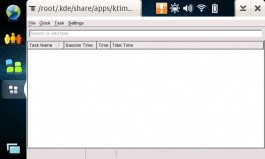KTimeTracker
| ktimetracker running on the N810 |

KTimeTracker is a standalone desktop application. This page is for people who want to participate in the ktimetracker community. So, for (future) ktimetracker developers.
Where is what?
- The latest development sourcecode is available via web at https://cgit.kde.org/ktimetracker.git/
- Craft blueprint: https://cgit.kde.org/craft-blueprints-kde.git/tree/extragear/ktimetracker
- CI setup: https://cgit.kde.org/sysadmin/ci-tooling.git
- Building dependencies for CI and kdesrc-build: https://cgit.kde.org/kde-build-metadata.git/
- The user documentation is generated from https://cgit.kde.org/ktimetracker.git/tree/doc
- KTimeTracker all-you-need in the internet: https://userbase.kde.org/KTimeTracker
- Another frontpage for users would be at http://kde.org/applications/, TBD: add it in there
How to build
Linux
Step 1: Install dependencies
- If you are running Fedora 32+ (For older Fedora releases please build kcalendarcore-5.63.0+ from sources.)
sudo dnf install kf5-kdbusaddons-devel kf5-kdoctools-devel kf5-kidletime-devel \
kf5-kio-devel kf5-knotifications-devel kf5-ktextwidgets-devel \
kf5-kwindowsystem-devel kf5-kxmlgui-devel kf5-kcalendarcore-devel
Step 2: Compile KTimeTracker from source code
mkdir build && cd build cmake .. && make && make install
Windows
Install Craft, then:
craft ktimetracker
Developing KTimeTracker
- Bug reports: our Bugzilla
- Workboard: https://phabricator.kde.org/tag/ktimetracker/
Architecture
ktimetracker is a standalone application. MainWindow displays a TimeTrackerWidget, that is a widget containing one TasksWidget (through a TaskView object). A TaskView is associated with a TimeTrackerStorage object that handle file load/save operations and monitor file changes on disk. A TasksWidget is a QTreeView that displays tasks from a model (TasksModel).
A task has a name, description, priority and times: the time, total time, session time and total session time. A task can have subtasks. The total time is defined as the task's and all its subtasks' times.
Roadmap to the classes
timetrackerwidget displays one or more taskviews in tabs, plus the searchWidget. timetrackerpart can be integrated into a mainwindow or a kontact plugin. mainwindow adds the menu.
MainWindow is the outermost layer and initializes the menus and actions, sets up the status bar, and handles many of the signal-to-slot connections. It holds a pointer to the timetrackerwidget and Preferences objects and implements the ktimetracker DBUS interface.
TaskView does most of the work in the application. This QListWidget subclass sets up the columns in the list, the idle detection timer, the auto save timer, and the desktop tracker. It starts and stops timers, handles importing and exporting and displays the edit task dialog in response to user action. TaskView holds a private pointer to Preferences and a timetrackerstorage object.
A Task is a QListViewItem subclass stores state such as the timer totals, if a timer is currently running for the task. It also defines the list view sort order and can return a pointer to a KCal::Todo object that holds the same information.
Preferences is a singleton that stores configuration options. It raises signals when options change (for example, the location where the ktimetracker data is stored) so the application can react and adjust.
how configuration is programmed
Configuration is also called preferences. The following files are involved:
- settings/cfg*.ui - tabs of the Settings dialog
- settings/ktimetrackerconfigdialog.cpp
- settings/ktimetrackerconfigdialog.h
- settings/ktimetracker.kcfgc
- settings/ktimetracker.kcfg
- ktimetracker.{h,cpp} - declaring/implementing the class KTimeTrackerSettings. These files are automatically generated from ktimetracker.kcfg.
- widgets/taskswidget.cpp - saves which tasks will be shown expanded and which ones collapsed
dbus
To test the dbus functionality of your KTimeTracker, have KTimeTracker running and proceed like in this example:
qdbus qdbus org.kde.ktimetracker qdbus org.kde.ktimetracker /KTimeTracker qdbus org.kde.ktimetracker /KTimeTracker org.kde.ktimetracker.ktimetracker.quit
How to reproduce a stale lock
Here is an example to give you an idea:
touch .kde/share/apps/kabc/lock/_home_tom_.kde_share_apps_karm_karm.ics.lock
Development Direction
The following similar programs can give you inspiration how to move forward developing:
- hourglass
- gnotime
- titrax
- taskCoach
- Hamster
About storage
The storage of your KTimeTracker data takes place in an iCal file. That format needs a bit of explanation. A simple one looks like the following:
BEGIN:VCALENDAR PRODID:-//K Desktop Environment//NONSGML libkcal 3.5//EN VERSION:2.0 BEGIN:VTODO DTSTAMP:20060915T181010Z ORGANIZER;CN=root:MAILTO: X-KDE-karm-totalSessionTime:0 X-KDE-karm-totalTaskTime:19 CREATED:20060609T230212Z UID:libkcal-652058592.803 SEQUENCE:0 LAST-MODIFIED:20060915T181010Z SUMMARY:fg CLASS:PUBLIC PRIORITY:5 PERCENT-COMPLETE:0 END:VTODO BEGIN:VEVENT DTSTAMP:20060915T181010Z ORGANIZER:MAILTO: X-KDE-karm-duration:300 CREATED:20060915T174305Z UID:libkcal-6397995.845 SEQUENCE:0 LAST-MODIFIED:20060910T174305Z SUMMARY:fg CLASS:PUBLIC PRIORITY:5 CATEGORIES:KArm RELATED-TO:libkcal-652058592.803 DTSTART:20060910T172346Z DTEND:20060910T174305Z TRANSP:OPAQUE END:VEVENT END:VCALENDAR
bugs
- Find ktimetracker's open bugs (without NEEDINFO bugs) with this query
- find all ktimetracker's bugs with this query
coding style
It is more important that you contribute than that you contribute with the right coding style. That having said, I prefer if you use code that is consistent with QtCreator's defaults. Opening and closing brackets and parentheses should be on the same row or column.
development direction
There should not be any "New" and "Close". ktimetracker should contain exactly one taskview. See https://bugs.kde.org/show_bug.cgi?id=182317 and https://bugs.kde.org/show_bug.cgi?id=265085
Polls
recent activity
- Ktimetracker history export and editing broken
- setting changes do not have immediate effect
- Store value in edit history dialog even if user does not change cell afterwards., fix, backport
- When saving to ical file, ktimetracker adds timezone info to DTSTART but not to DTEND, fix, backport
- when I start ktimetracker for the first time, a file dialog appears, fix, backport
- tray icons
Related Projects
http://websvn.kde.org/trunk/playground/base/plasma/applets/timetracker/
Readings
- RFC 2445

